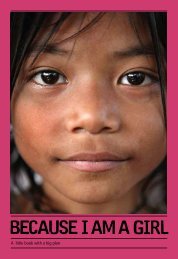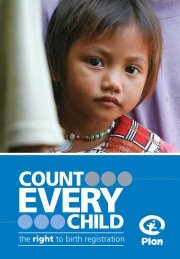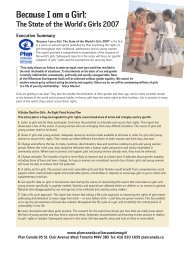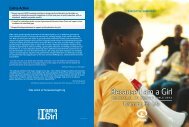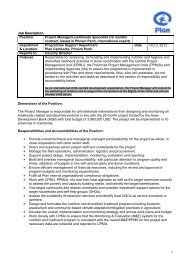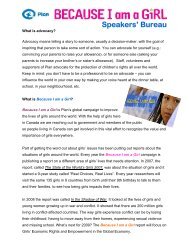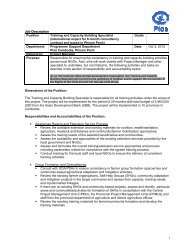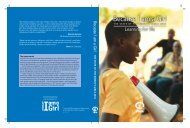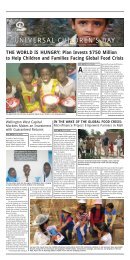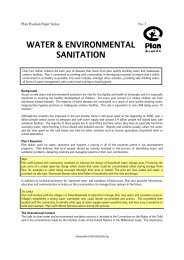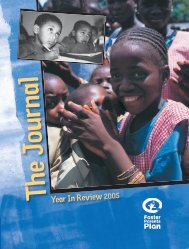Plan Worldwide Annual Review and Combined Financial ...
Plan Worldwide Annual Review and Combined Financial ...
Plan Worldwide Annual Review and Combined Financial ...
You also want an ePaper? Increase the reach of your titles
YUMPU automatically turns print PDFs into web optimized ePapers that Google loves.
Expenditure on sexual <strong>and</strong> reproductive health covers costs related to family planning, HIV/AIDS <strong>and</strong> sex education. This expenditure represents<br />
3%, or €15 million of total programme expenditure. It is higher than 2011 as the HIV prevention <strong>and</strong> support programme ramped up in Benin<br />
<strong>and</strong> there were smaller increases in many other countries. Conversely expenditure decreased in Kenya due to the government taking over<br />
through community health workers.<br />
Education accounted for 16% or €79 million in 2012, compared to €81 million in 2011. Education programme costs comprise costs related<br />
to teacher training, school infrastructure improvements <strong>and</strong> advocacy for education policy improvements including the Learn Without Fear<br />
campaign. Expenditure in Burkina Faso declined as the Bright grant comes towards its end, but this was offset by grant funded projects,<br />
including school construction, in Cameroon, Guinea, Mali, Pakistan <strong>and</strong> Zimbabwe.<br />
Water <strong>and</strong> sanitation expenditure of €47 million, increased by 6% compared to 2011, primarily due to higher spending in Burkina Faso for<br />
family latrines <strong>and</strong> boreholes <strong>and</strong> in Pakistan in flood affected areas. Conversely expenditure in Ethiopia, Guatemala <strong>and</strong> Vietnam is lower<br />
due to a greater focus on prevention <strong>and</strong> education rather than construction <strong>and</strong> rehabilitation of water systems. This programme area,<br />
representing 10% of total programme expenditure, covers community infrastructure such as water systems, latrines <strong>and</strong> housing including<br />
assisting communities with achieving provision from local authorities.<br />
Economic security which covers costs relating to microfinance <strong>and</strong> natural resource management, fell by 2% over 2011 <strong>and</strong> represents<br />
€39 million or 8% of programme expenditure. Grant funded projects finished in Pakistan <strong>and</strong> Zambia, whilst expenditure increased in<br />
Cambodia due to targeting more communes <strong>and</strong> beneficiaries. Otherwise there were no significant country movements from the previous year.<br />
Programmes to protect children from exploitation, neglect, abuse <strong>and</strong> violence represent €28 million or 6% of total programme costs.<br />
These costs increased by €12 million compared to 2011 with new grant funded programmes commencing in Bangladesh, Haiti, Malawi<br />
<strong>and</strong> Sudan plus smaller increases across most countries. Expenditure in this programme area relates to training of children <strong>and</strong> human<br />
rights <strong>and</strong> capacity building at local <strong>and</strong> national level.<br />
Spending on participation programmes amounted to €71 million, an increase of 26%. Participation programmes include development<br />
education work through child media, life skills training <strong>and</strong> the ‘Because I am a Girl’ (BIAAG) campaign, which aims to fight gender inequality<br />
<strong>and</strong> promote girls’ rights. There were new grant funded programmes in Bangladesh, Malawi, Vietnam <strong>and</strong> Zambia <strong>and</strong> in Honduras an<br />
increased focus on socio-political awareness <strong>and</strong> participation. Additionally, there was increased expenditure on the BIAAG campaign<br />
ahead of the global launch on 11 October 2012, coinciding with the first UN International Day of the Girl-Child.<br />
Expenditure relating to disaster risk management includes costs related to disaster risk reduction <strong>and</strong> relief activities ranging from food<br />
<strong>and</strong> medicine distribution to child psychosocial support <strong>and</strong> protection. These costs were €60 million compared with €46 million in 2011.<br />
Higher costs relating to the food crises <strong>and</strong> drought in the Sahel <strong>and</strong> the Horn of Africa were incurred in South Sudan, Ethiopia <strong>and</strong> Kenya<br />
<strong>and</strong> for typhoon responses in El Salvador <strong>and</strong> Philippines. These were offset by reduced expenditure in Niger <strong>and</strong> Zimbabwe <strong>and</strong> in Haiti,<br />
as programmes there moved from immediate disaster response to longer term recovery.<br />
Sponsorship communications comprises costs associated with communication between sponsors <strong>and</strong> sponsored children. These costs have<br />
increased by 1% globally to €52 million.<br />
Fundraising costs increased by 23% compared to the previous year, to €91 million. These costs increased in most NOs, with significant growth<br />
in Australia, UK <strong>and</strong> USA due to a range of investments in building fundraising capacity <strong>and</strong> additionally investment in the UK to raise general<br />
awareness of the <strong>Plan</strong> br<strong>and</strong>. Also, in Germany there was a one off payment of €6 million as described in note 13 to the financial statements.<br />
Other operating costs of €53 million represent an increase of €3 million over the previous year, with higher costs in most NOs. Trading<br />
activities remain a minor activity, representing less than 1% of income <strong>and</strong> expenditure in both years.<br />
Gains on foreign exchange of €11 million in 2012 <strong>and</strong> losses of €17 million in 2011 represent the revaluation of non-Euro balances <strong>and</strong> primarily<br />
reflect the movements of the Euro relative to the USD in each year.<br />
8



